Indiana teachers on secret 'armed response teams' can use deadly force to protect students
Editor's note: This story was originally published in September. We are republishing it as we look back at some of our most-read stories of the year.
Assessments of deadly school shootings from Colorado to Texas to Florida have made one thing clear: Delaying an armed response, even by minutes, may mean the difference between averting a tragedy and mass casualties.
That lesson is driving a small but growing number of Indiana school corporations to establish secret "armed response teams" made up of teachers and other school staff. With a boost this year from lawmakers, who approved state funding to cover part of the cost, at least seven school corporations are now in the process of training school staff how to use deadly force in their classrooms, hallways or gymnasiums.
"The reality is, if you've got somebody who's entered your facility with the intent to do harm, or even kill, as heavy as that is, we want to make sure that they're met with resistance," said Superintendent Rolland Abraham of the Randolph Central School Corp., which approved plans this month to start armed response teams in the district's five school buildings. "Because that's what it takes to secure lives — and in these scenarios, you're dealing with seconds."
Indiana is one of at least 28 states that allow teachers to carry firearms in K-12 schools, according to tracking by the Giffords Law Center, a gun violence prevention organization. In the majority of those states, employees need permission from school districts.
The concept remains controversial, with the divide closely mirroring political lines. Supporters contend that “a good guy with a gun” is one answer to America's school-shooting epidemic because it fills the need for immediate action. Opponents argue that arming teachers only increases access to guns and further burdens already overworked educators with a new, crushing responsibility.
Allowing teachers to carry guns at school is not new in Indiana. State lawmakers gave school districts the authority to let teachers carry firearms in 2013 after a shooting at Sandy Hook Elementary School in Connecticut that killed 26 people, including 20 children. At least four other Indiana school corporations, all rural districts where police resources are limited and guns have long been part of the culture, already allowed some staff to carry or access guns at school.
But it wasn't until this year that Gov. Eric Holcomb signed into law state-funded firearm training for teachers. Putting money behind the concept has prompted some schools — including Randolph Central based in Winchester — to give the idea more serious consideration. In all, the state doled out $101,979 for teacher firearm training.
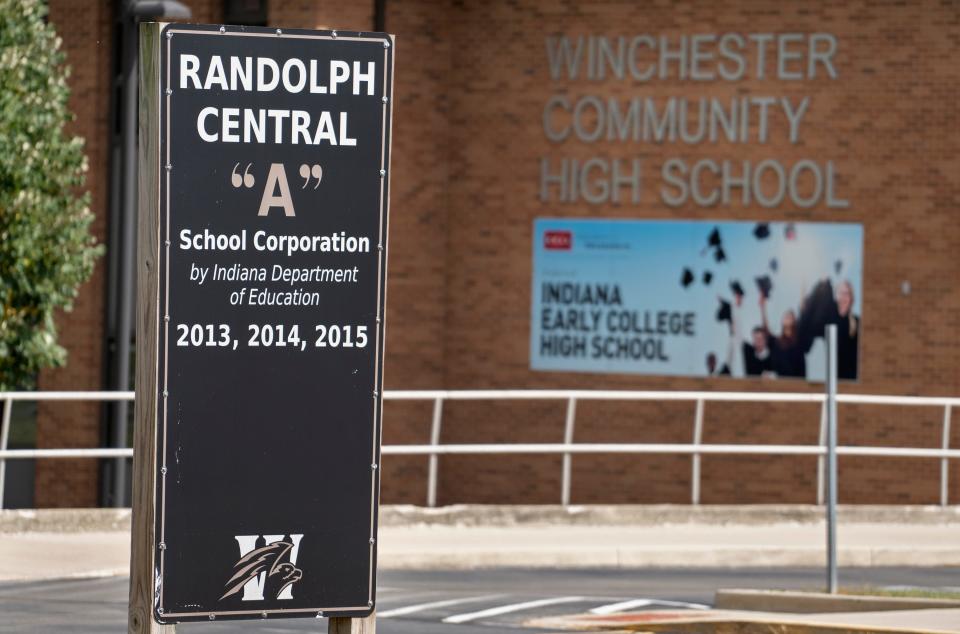
The Indiana Department of Homeland Security, which administers the grants, declined to reveal the identity of the seven school districts that received those funds, citing a state law that allows public agencies to keep school security measures confidential.
Teachers with handguns will keep them in biometric safes
Randolph Central's school board, which includes a former sheriff and the spouse of another former sheriff, voted unanimously during a public meeting earlier this month to adopt its new plan. No one from the public or teachers association spoke in opposition. Under the plan, teachers and school staff who volunteer will be organized into "armed response teams" in each of the district's five schools. Those employees will have access to loaded handguns stored in biometric safes hidden in strategic locations at the schools.
The identity of team members will be kept secret, meaning parents and students won't know which of their teachers are part of the program.
"Team members are explicitly authorized to use deadly force to protect students, staff members, or others from what is reasonably believed to be an imminent threat of death or serious bodily injury due to violence," the policy says.
Abraham said the district plans to spend about $47,000 to implement the armed response teams. The state grant will cover half that cost, he said.
The state does not require schools to train teachers before arming them, but grant recipients must commit to a minimum 40 hours of training. Requirements include instruction on topics such as tactical movement and maneuvering while armed and dynamic gun drills for shooting in high-stress and highly populated environments.
Randolph Central's policy also requires members of its armed response teams to score 90% or above in handgun accuracy — a standard higher than the 80% requirement for police officers.
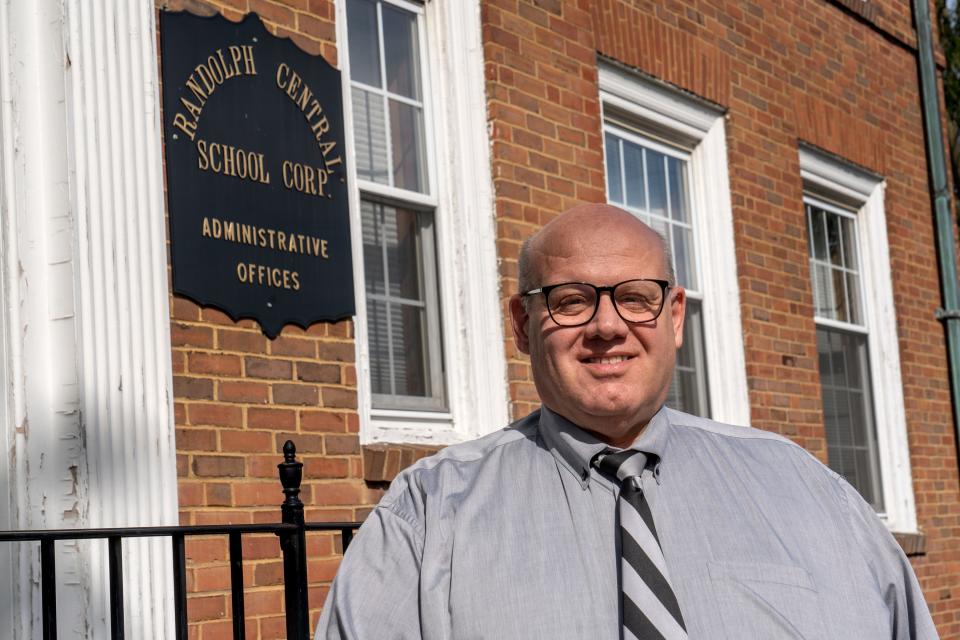
'Response time is everything'
For many rural school districts, one major consideration in arming teachers is the length of time it might take law enforcement to reach their schools. Many rural police and sheriff's departments have few personnel and cover vast areas.
"It really has to do with response times," Abraham said. "The reality is response time is everything in a crisis situation."
He cited data from a U.S. Secret Service report that analyzed 41 targeted school attacks and found not a single one was ended by outside law enforcement agencies responding to the scene from off campus. Many ended when the attacker committed suicide or fled the scene. Twenty-two percent ended with intervention by non-law enforcement adult school staff.
High-profile public shootings in Central Indiana have been reflective of that data. During a shooting at Noblesville West Middle School in 2018, a wounded seventh-grade science teacher, Jason Seaman, tackled the 13-year-old shooter after throwing a basketball at him. A shooting at the Greenwood Park Mall that left three people dead last year ended when a legally armed 22-year-old bystander, Elisjsha Dicken, fatally shot the gunman.
The 19-year-old former employee who committed the worst mass shooting in Indianapolis history, leaving eight people dead at a FedEx facility in 2021, killed himself before law enforcement arrived at the scene.
"Most of the time the event is over before law enforcement is able to get there," Abraham said. "So that's kind of a critical security gap. And we just want to make sure that we have a line of defense between our students and our staff, and any one that would want to do them harm."
Budget considerations are another factor.
Jeremy Gulley, superintendent of Jay School Corp., which implemented armed response teams four years ago, said officials have spent about $31,600 in local tax dollars on training and equipment.
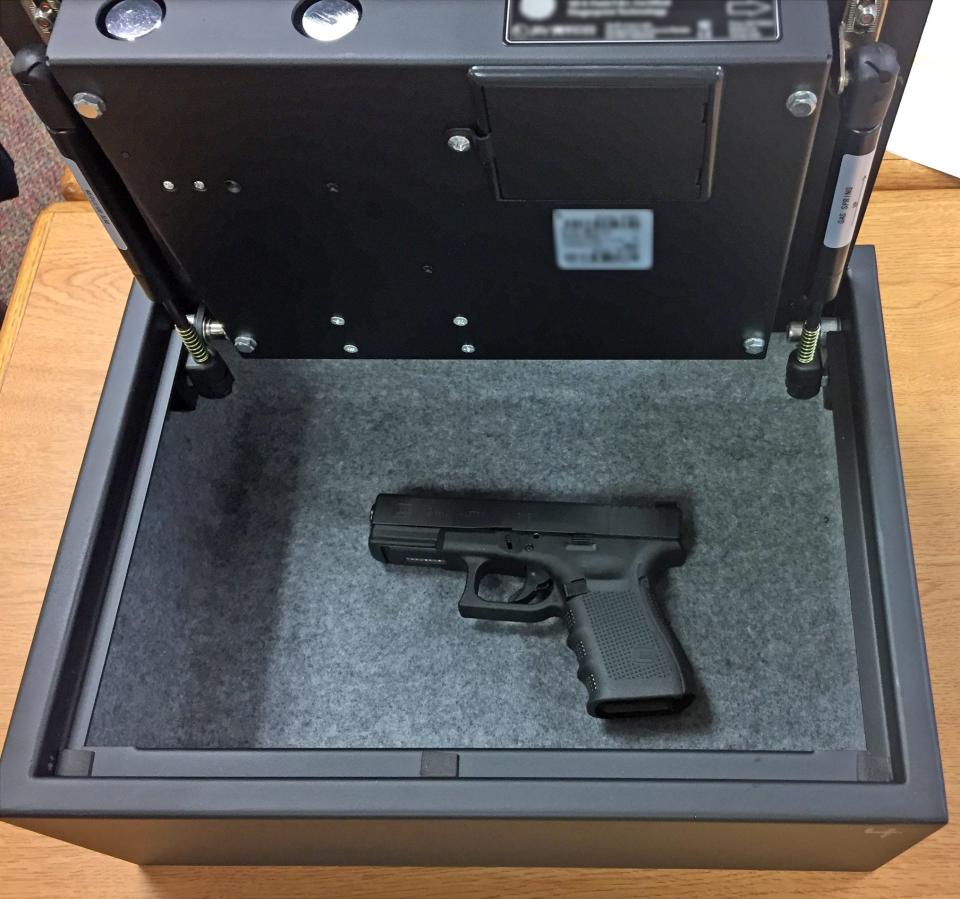
Gulley, a retired lieutenant colonel from the Indiana Army National Guard, agrees there should be trained law enforcement officers at every school in the country, but smaller communities have limited resources. In Jay County, for example, the local police agency is already facing challenges in staffing its own ranks, so hiring school resource officers takes a backseat, Gulley said.
The district has one school resource officer, and officials have secured state funding to hire a second one. Gulley estimates that to have one officer at each of the district’s six schools would cost about $480,000 a year.
Since implementing the program, he said, no employees have had to pull the trigger. In 2021, school officials received an anonymous tip about a social media threat made against Jay County Jr-Sr High School. Gulley said members of the team retrieved the guns from the biometric safes and carried them concealed while the Jay County Sheriff’s Office investigated the threat.
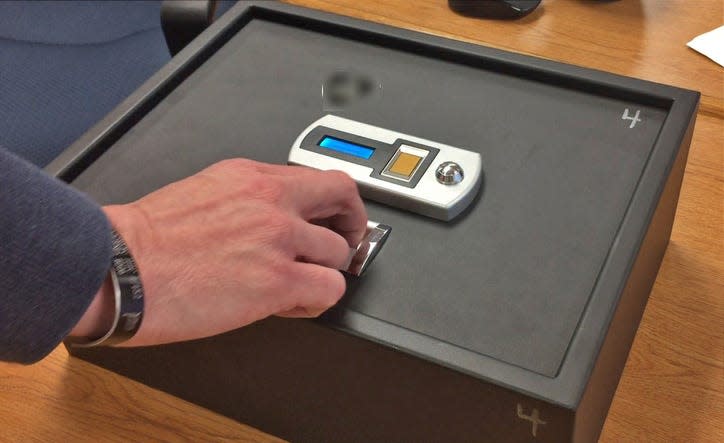
Treating schools 'like a war zone'
Critics, however, say increasing the prevalence of guns in schools will make children less safe. And they say asking teachers to become armed security guards places too much burden on educators, who already have to act as social workers and counselors.
"We’re asking an awful lot of these people. This shouldn’t be their job,” said Paul Helmke, director of the Civic Leaders Center at Indiana University in Bloomington and former president of the Brady Center to Prevent Gun Violence, a gun control advocacy group. “You shouldn’t have to have to get your education degree and take a marksmanship class."
Ramya Swami, state policy manager at the Brady Center, said the schools’ safety policy is akin to expecting teachers to act like “armed soldiers” and treating schools like a “war zone.”
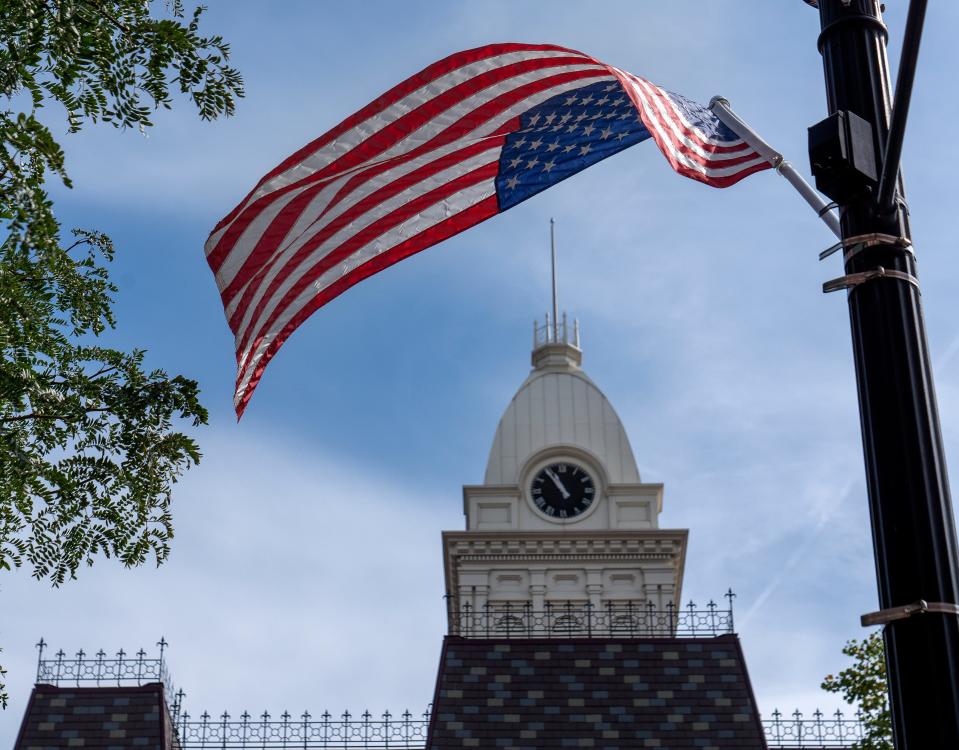
But in most of the school districts where armed response teams are being rolled out, guns have long been an everyday part of life. The local conservation club in Randolph County, which boasts multiple shooting ranges, is a popular gathering spot. Kids learn about firearms as part of scouting and 4-H Club. And in the county seat of Winchester, handguns are not an uncommon sight on the hips of those in attendance at city council meetings.
"It’s all part of our culture," said Winchester Council President Jim Nunez, Jr., whose grandson attends a Randolph Central elementary school.
Nunez, a Democrat, said he supports the district's decision to create armed response teams. They are the latest addition to a broader school security plan that includes additional school resource officers, door buzzers to prevent unauthorized access, increased mental health services, and more security cameras.
"I’m glad they are going forward with security," Nunez said.
He worries about the impact on teachers, though. He noted the district's new policy is silent on the question of whether participating teachers will be compensated for their increased responsibilities, even though they are being asked to potentially "take a bullet."
"The teachers I know, I don’t think they would volunteer," he said.
In a national poll of teachers, 30% of males in rural schools like Randolph Central said they would personally carry a firearm at school if allowed, according to the survey by Rand Corp., a nonprofit, nonpartisan research organization. That was the largest percent among teachers in rural and urban schools.
The Randolph Central Classroom Teachers Association did not respond to inquiries from IndyStar. National polls have consistently shown that a majority of teachers oppose the idea or believe it will make schools less safe.
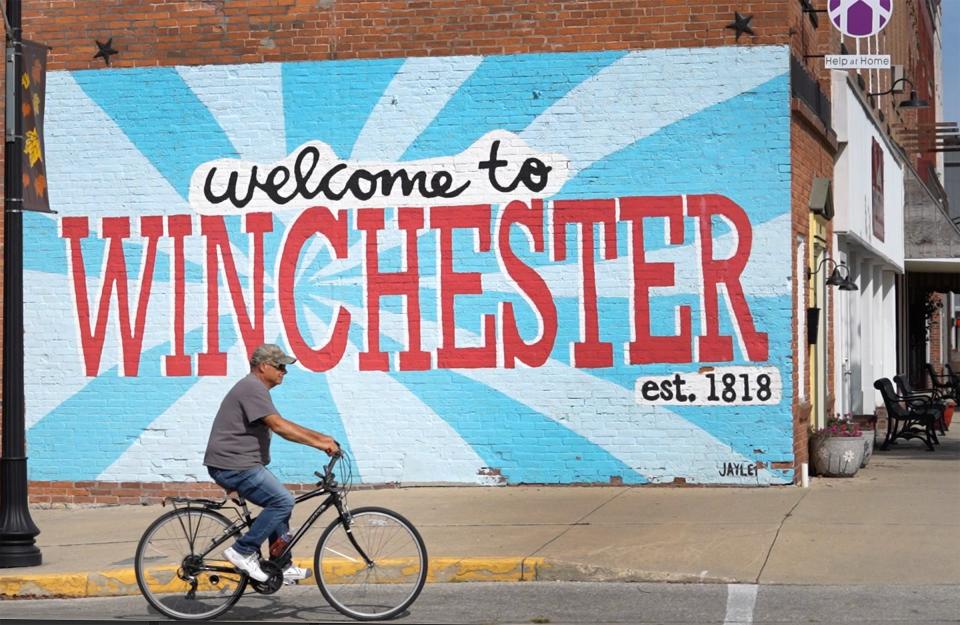
Abraham, the superintendent, said he anticipates providing a stipend for members of the armed response teams, but the amount hasn't been determined yet.
State Rep. Jim Lucas, a Seymour Republican who carried the legislation to fund firearm training for teachers, said he doesn’t feel like he’s asking Indiana teachers to take on additional responsibilities outside the scope of their jobs as educators because Indiana’s program is voluntary.
“We're giving them the opportunity to be able to save themselves and possibly the children when everything else has failed,” he said.
He pointed to what he called a failure of dependence on school resource officers, in particular at Marjory Stoneman Douglas High School in Parkland, Florida, and at Robb Elementary School in Uvalde, Texas, where law enforcement took 77 minutes to stop the shooter.
“So right there, I don't know what more proof we need," he said. "We need teachers to volunteer.”
Lucas's bill, which became law in July, is not the first proposal he has put forth to arm school staff. In 2013, he filed a measure that would have mandated an armed protection officer for each school. That officer could be a principal, teacher, staff or security guard. The proposal, which was backed by the National Rifle Association, failed to advance.
Ken Trump, president of the Cleveland-based National School Safety and Security Services, said arming teachers also raises serious accountability questions: Who will oversee this group of armed educators who are authorized to shoot to kill? Is it the principal? The superintendent?
“It’s realistic to think that you are going to have educators overseeing a quasi police function," he said. "I feel it’s a high-risk, high liability proposition.”
So, too, is the presence of guns in a setting densely populated with children, according to the Giffords Law Center, a gun control advocacy group. The group tallied nearly 100 publicly reported incidents in the last five years in which adults mishandled guns on school property.
Critics say arming teachers also fails to address a key underlying cause of mass shootings in America — easy access to high-powered rifles with large-capacity magazines.
“What has enabled our society to become so dangerous and made it so easy for people who want to do harm to get a gun?” said Lindsay Nichols, policy director at the Giffords Law Center.
'More guns in good people's hands'
In Winchester, a city of about 4,800 people located about 85 miles northeast of Indianapolis, many of the parents going about their business last week said they own guns or had some experience using them.
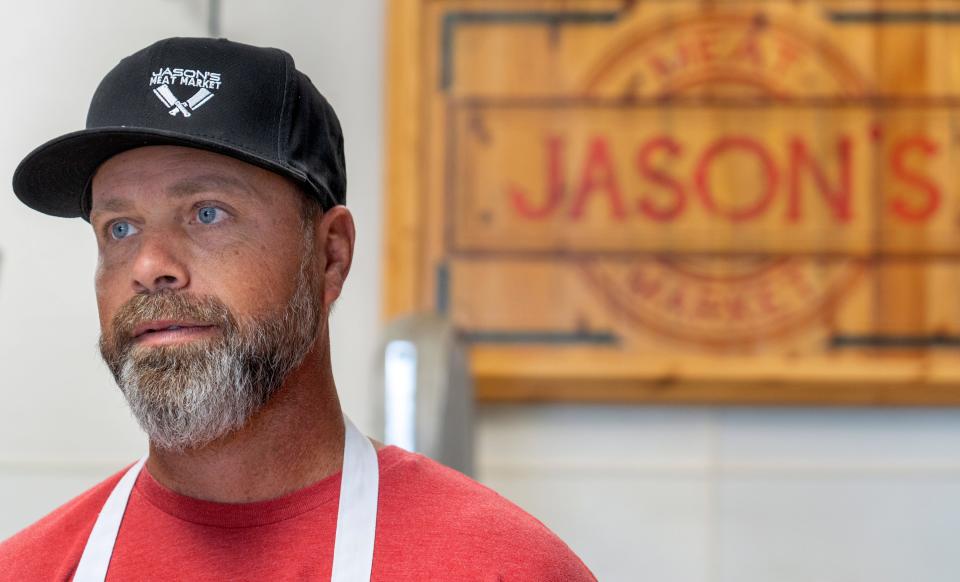
“I think there needs to be more guns in good people’s hands. We’re not going to get them out of criminals’ hands,” said Jason Logan, owner of Jason’s Meat Market, one the small shops, restaurants, and offices that surround Randolph County’s red-brick courthouse. Just down the street, the city hall, the mayor’s office, and the police and fire departments are all housed in one single-story building.
Logan is a gun owner and has five children ages 6 to 16 attending school in the district. He said arming teachers is a step in the right direction and will serve as a deterrent against potential shooters.
Jeremy Butler, owner of The Blade barbershop across the street from the meat market, has a 7-year-old daughter who attends school in the district. He's also in favor of the policy as long as staffers are trained.
“Anything to keep kids safe,” said Butler, who described Winchester as a town of pro-gun “country boys.”
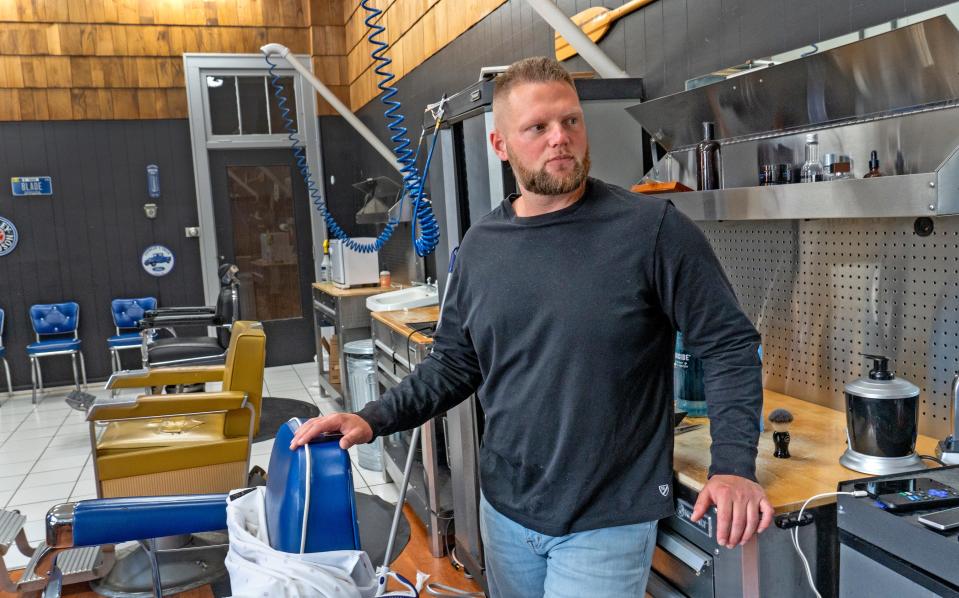
Carolyn Fields, who works at a local boutique, favors arming teachers as long as they’ve gone through a background check and are “very responsible adults.”
At schools where armed teachers are now a part of their security plans, administrators say they hope parents and students don't notice any difference at all — unless their worst nightmares become a reality.
Todd Hitchcock, superintendent of Shelby Eastern Schools, where armed response teams have been in place since last year, said he doesn't want it to be front of mind for students, parents and staff.
“I don't want our teachers and our students and our parents to have to think about these things on a daily basis the way I do,” he said. “It's a program that's in place, but if you walked into our school, you wouldn't be able to tell at all that it's in place and that's intentional.”
Contact IndyStar reporter Tony Cook at 317-444-6081 or tony.cook@indystar.com. Follow him on Twitter: @IndyStarTony.
Contact IndyStar reporter Kristine Phillips at (317) 444-3026 or at kphillips@indystar.com.
Contact IndyStar reporter Alexandria Burris at aburris@gannett.com. Follow her on Twitter: @allyburris.
This article originally appeared on Indianapolis Star: Indiana funds firearm training for teachers, forms secret response teams

